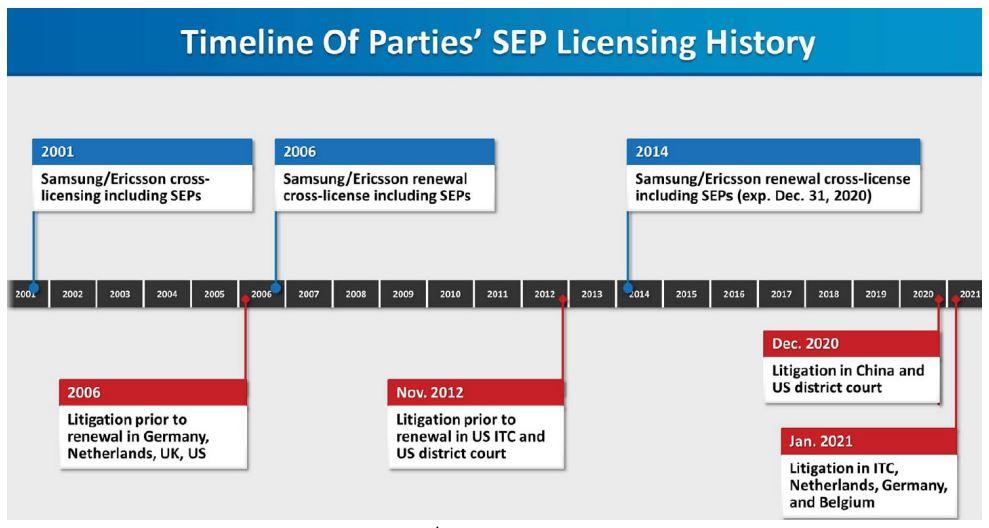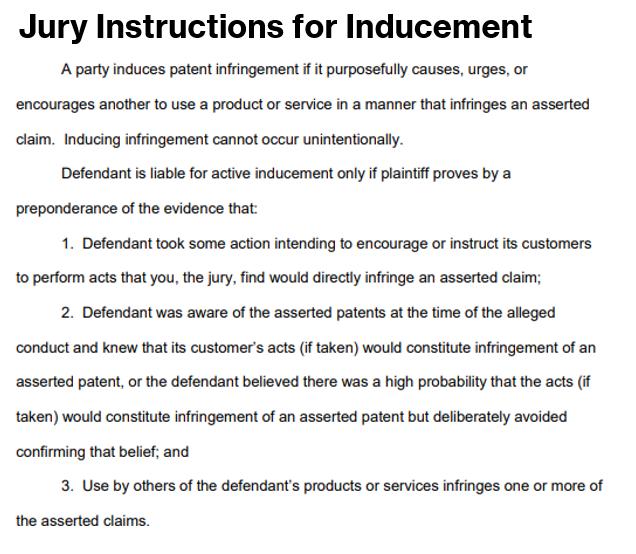
Guest Post by Prof. Contreras: A Statutory Anti-Anti-Suit Injunction for U.S. Patent Cases?
Guest Post by Professor Jorge L. Contreras
On March 8, 2022, five U.S. senators[1] introduced the “Defending American Courts Act” (DACA) in the Senate Judiciary Committee.If enacted, DACA would penalize parties that assert foreign anti-suit injunctions (ASIs) in U.S. patent infringement proceedings, effectively creating a statutory “anti-anti-suit injunction” (AASI) applicable in all courts across the U.S.In this post, I briefly consider the reasons behind the DACA and its potential impact.
The Controversy over ASIs in FRAND Cases
The controversy over ASIs has been brewing for several years.As I have discussed at length elsewhere, ASIs are in personam procedural remedies that have existed under the common law for centuries. Essentially, an ASI is issued by a first court to prevent a party from pursuing litigation in a second court when it would interfere with the proceedings in the first court. ASIs have been issued routinely by courts in the U.S. and UK, for example, to prevent a party from pursuing litigation over a matter that is subject to an arbitration agreement.
Beginning in 2012, however, ASIs emerged as litigation tools in suits involving the licensing of standards-essential patents (SEPs).Under the rules of several major standards-development organizations (SDOs), SDO participants that hold patents that are essential to products implementing the SDO’s standards must license those patents to product manufacturers (implementers) on terms that are “fair, reasonable and nondiscriminatory” (FRAND).Because SDOs, as a rule, do not specify the level of FRAND royalties, SEP holders and implementers sometimes disagree over the amounts that should be paid. Litigation ensues, both as to the SEP holder’s compliance with its FRAND commitment, and the implementer’s infringement of the SEPs (given that it does not yet have a license).And because many of the markets for standardized products (e.g., smartphones, laptops and gaming devices) are international, litigation is often prosecuted in several countries simultaneously.
In 2012, Microsoft and Motorola were engaged in such a dispute.Microsoft sued Motorola for violation of its FRAND commitments to two SDOs in a U.S. district court.Motorola brought an infringement action against Microsoft in Germany.The German court, finding infringement, issued an injunction against Microsoft’s infringing activity in Germany.Microsoft then sought an ASI from the U.S. to prevent Motorola from enforcing the German injunction.The district court granted the ASI on the basis that the parties were the same, the resolution of the U.S. matter would dispose of the German matter, and the continuation of the foreign litigation would frustrate U.S. policies against avoiding inconsistent judgments, forum shopping and engaging in duplicative and vexatious litigation (871 F. Supp. 2d 1089, 1098-100 (W.D. Wash. 2012), aff’d 696 F.3d 872 (9thCir.)).
ASIs and FRAND Litigation in China
In 2017, the UK High Court (Patents) established a global FRAND royalty rate in Unwired Planet v. Huawei, a case involving the infringement of a handful of UK SEPs.Courts in China soon followed suit, assessing FRAND rates applicable around the world (Peter Yu, Yu Yang and I discuss this trend here). In response, parties litigating FRAND cases in the U.S. sought ASIs to enjoin their counterparties from pursuing those actions in China, at least until U.S. courts could make their own FRAND determinations.In at least two of these cases, U.S. courts issued ASIs prohibiting actions in China (TCL v. Ericsson, 2015 U.S. Dist. LEXIS 191512 (C.D. Cal.), and Huawei v. Samsung, No 3:16-cv-02787-WHO (N.D. Cal., Apr. 13, 2018) – both cases are discussed here).
Then, beginning in 2020, Chinese courts began to issue ASIs of their own, this time prohibiting competing actions in the U.S., Europe, India and elsewhere.During the course of 2020, Chinese courts, including the Supreme People’s Court, issued an unprecedented five ASIs to prevent parties from pursuing foreign actions that could interfere with their own proceedings (these ASIs are discussed here).
In response to this move, courts in the U.S., Germany, France and India began to issue anti-anti-suit injunctions (AASIs), prohibiting the parties before them from seeking ASIs (discussed here and here and here).Not surprisingly, some courts, including those in China, then issued anti-anti-anti-suit injunctions (AAASIs) to prevent parties from seeking AASIs – a procedural spiral that I have referred to as “anti-suit injunctions all the way down”.
Political Responses to Chinese ASIs

The increasing use of ASIs by Chinese courts has led to political responses in the U.S. and Europe.In February, the European Union filed a complaint in the World Trade Organization over China’s lack of transparency in issuing ASIs against European parties. And in April 2021, the U.S. Trade Representative described China’s increasing use of ASIs as “worrying” in her Special 301 Report.
The DACA also seeks to address this situation.Senator Thom Tillis, in introducing the bill, stated “The Chinese Communist Party’s attempt to make Chinese courts the world arbiter of intellectual property must be stopped.” The bill’s sponsors explain that its purpose is “to prevent China from stealing intellectual property from American companies through their corrupt court system.”Thus, while the text of DACA speaks to all “foreign” ASIs, the bill seems targeted directly at Chinese proceedings.
The Defending American Courts Act
If enacted, DACA would impose two types of penalty on a party that seeks to restrict an action for patent infringement before a U.S. court or the International Trade Commission (ITC) through the assertion of a foreign anti-suit injunction.First, the party is prohibited from challenging the asserted patent at the Patent Trial and Appeals Board (PTAB) (Sec. 2(c)).Second, if the party is found to infringe the patent, the infringement will be presumed to be “willful” for purposes of enhancing damages under Section 284 of the Patent Act, and the action will be deemed “exceptional” when determining whether to award attorney fees under Section 285 (Sec. 2(b)).
The text of DACA is not particularly detailed, leaving open many questions regarding the proceedings, both foreign and U.S., that would be affected (e.g., Does DACA affect PTAB actions initiated prior to the assertion of a foreign ASI? If so, is there any effect on preclusion of district court invalidity challenges under the recent CalTech v. Broadcom case? Is an action still deemed “exceptional” for awards of attorneys’ fees even if the asserted patents are eventually invalidated?)Hopefully some of these gaps will be filled as and if the bill moves through committee.To this end, DACA also calls for the USPTO to conduct a study of “the harms resulting from anti-suit injunctions” (Sec. 3(a)(2)) within one year of the enactment of the Act.Perhaps it would make sense for this study to be conducted before legislation like DACA is adopted, to determine what harm, if any, should be addressed, and what the most appropriate response might be.
DACA as a Legislative AASI?
Despite the rhetoric accompanying its introduction, the measures that would be imposed by DACA are relatively modest. While one could conceptualize DACA as a legislative version of the AASI, it does not actually prohibit parties from seeking or asserting foreign anti-suit injunctions in U.S. tribunals, nor would it direct U.S. courts to issue AASIs or take other actions in response to the assertion of foreign ASIs.
In fact, the AASIs already issued by courts in the U.S., Europe and India in response to Chinese ASIs are generally more punitive than the contingent measures that would be imposed under DACA.For example, in Ericsson v. Samsung, No. 2:20-CV-00380-JRG (E.D. Tex. Jan. 11, 2021), a U.S. district court responded to an ASI issued to Samsung by a court in China by prohibiting Samsung from enforcing the ASI against Ericsson (under penalty of contempt) and ordering Samsung to indemnify Ericsson against any monetary penalties imposed by the Chinese court.
Thus, while the penalties imposed by DACA are meaningful and may, indeed, dissuade some litigants in U.S. matters from seeking foreign ASIs, it is not clear that they offer greater deterrents than the AASIs that U.S. courts are already empowered to issue.
DACA, of course, offers an ex ante deterrent, imposing a penalty before a foreign ASI is sought or asserted in the U.S.However, courts in Germany have recently begun to issue preemptive AASIs ordering parties who have not yet initiated any actions in China not to do so, given the “prevalent trend of Chinese companies filing ASIs” (discussed here and here), and a Dutch court has also indicated that it might consider doing so.
What Goes Around Comes Around
A final thought: despite the explicit anti-China tenor of the comments accompanying DACA’s introduction, we should remember that ASIs are not Chinese inventions.They are products of the common law and were first used in FRAND cases by U.S. courts against actions in China.As my co-authors and I argue here, the Chinese courts effectively “transplanted” ASIs to China from the U.S. and UK.
Like ASIs themselves, it is not unlikely that the enactment of DACA in the U.S. will trigger foreign responses in kind.What would happen if China, Germany and other countries adopted legislation similar to DACA, preventing U.S. companies in foreign courts from enforcing ASIs issued by U.S. courts? As a procedural mechanism in U.S. and foreign proceedings, the ASI has many legitimate uses.Yet legislative deterrents imposed by other countries could limit the use of ASIs by U.S. parties when appropriate.One risk of unilateral measures such as DACA is that they could trigger reciprocal actions by other countries that could cause more harm than good to U.S. companies and markets.It is thus important that policy makers consider fully both the potential benefits of DACA, as well as its potential costs.As noted above, the study called for under Section 3(a)(2) of DACA might be useful to conclude prior to the enactment of legislation of this nature.
[1] Thom Tillis (R-NC), Chris Coons (D-DE), Tom Cotton (R-AR), Mazie Hirono (D-HI), and Rick Scott (R-FL)
}})